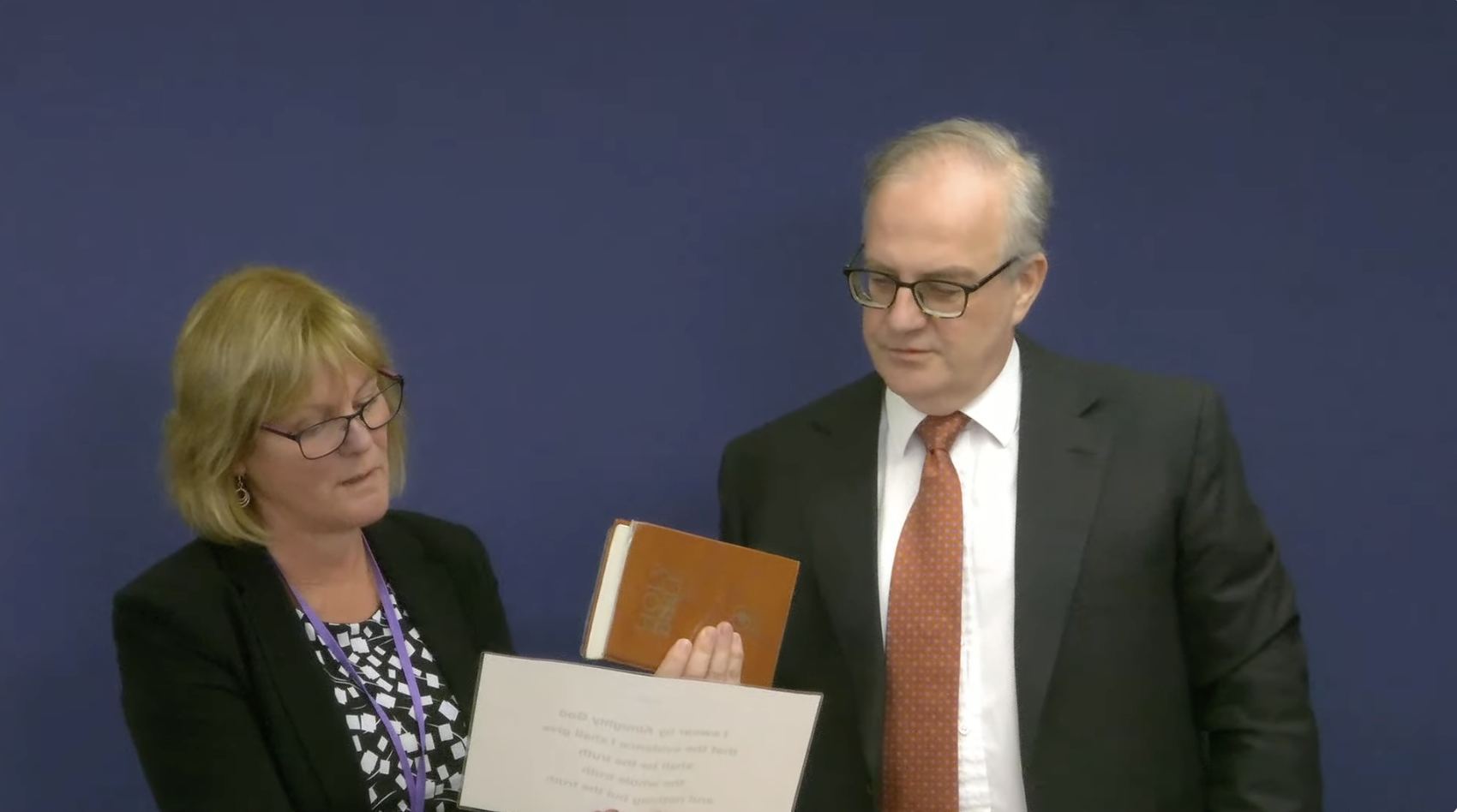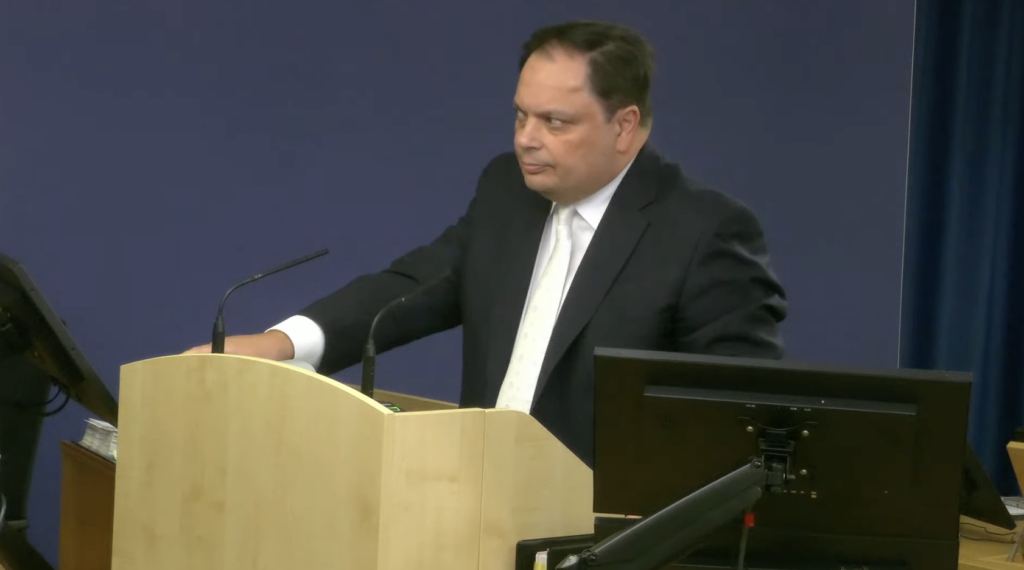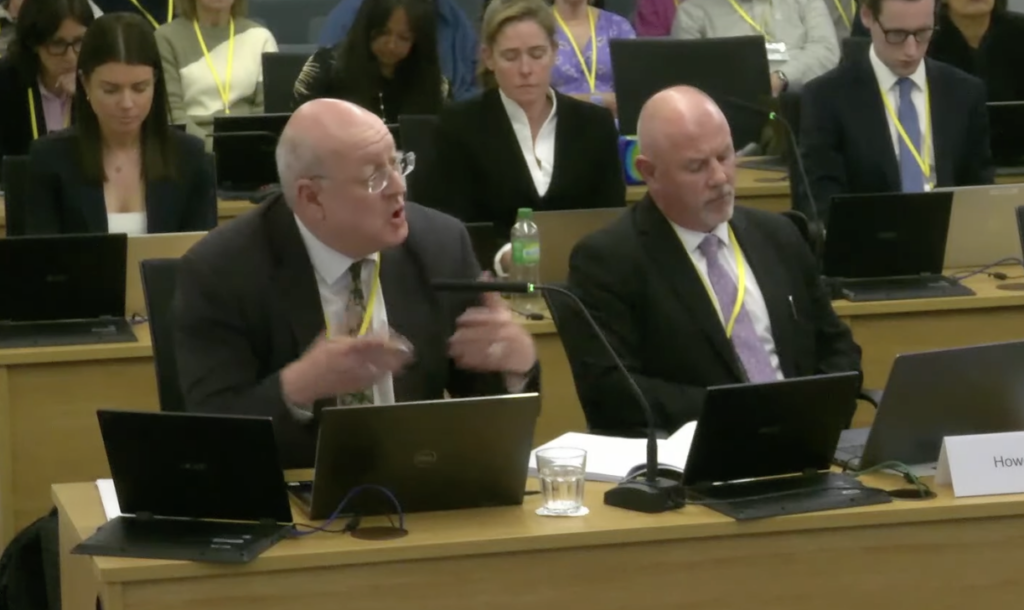
Poor old Tony Robinson, just trying to make an honest crust defending his client, whilst being misled by his instructing solicitors (Womble Bond Dickinson), his client’s supplier (Fujitsu) or possibly even his client – the Post Office!
As leading counsel for the Post Office in the Horizon Issues trial during Bates v Post Office, de Garr Robinson regularly seemed to be on the receiving end of duff information, which he took at face value and dutifully represented to to the High Court as fact. This, as he described in his witness statement, was sub-optimal. Recalling the first such occasion, he wrote:
“I had unintentionally misled the court. As will be clear from the rest this statement, this was not the first occasion on which such a thing happened, and nor was it the last. It is a horrifying experience.”
Avoiding the truth
One useful bit of information de Garr Robinson was appraised of was the First Clarke Advice. This document made it clear that Fujitsu engineer Gareth Jenkins should never be used as a witness in any court proceedings given his apparent inability to tell the truth about problems with the Horizon IT system.
As Jason Beer KC established, at a meeting of Post Office civil and criminal lawyers on 10 September 2018, two months before the first Bates v Post Office trial and well after the litigation was underway, de Garr Robinson was told that Gareth Jenkins:
a) was an unreliable witness
b) had been treated by the post office as a witness upon whom they could not place reliance
c) was said to have given misleading/false evidence in criminal proceedings
The problem is, Gareth Jenkins knew quite a lot about the Horizon system. He designed it. Yet a legal advice suggesting he might be partly responsible for miscarriages of justice, in the eyes of the Post Office, had to be kept secret, lest the truth come out. And this meant telling lies.
A note of the 10 September 2018 meeting recorded that Fujitsu was told the reason Jenkins could not be used as a witness in the group litigation was because the Post Office “did not wish to mix civil and criminal evidence”.
Beer suggested this was “a false explanation”.
“I would say so”, agreed de Garr Robinson.
In January 2019 Freeths, the Subpostmasters’ solicitors in Bates v Post Office, were keen to know why Jenkins was not being called as a witness. They were told by the Post Office that Jenkins “had acted as an expert witness in relation to a number of prosecutions that are being reviewed by the CCRC, and therefore, it was therefore not appropriate to call him.”
“That would be a false explanation too, wouldn’t it?” asked Beer.
“It would be economical with the truth, yes”, replied de Garr Robinson.
“Therefore false,” Beer pushed.
“I think so”, agreed de Garr Robinson.
Subtle signals

It was easy for de Garr Robinson to agree the Post Office had lied to Fujitsu and Freeths, because he was not the one who had done the lying. However de Garr Robinson did co-write the Post Office’s closing submission to the High Court in the Horizon Issues trial.
The closing submission states Fujitsu’s Torsten Godeseth was chosen over Gareth Jenkins to give evidence in the Horizon issues trial due to “the involvement that Mr Jenkins had had in a number of criminal prosecutions that are currently being looked at by the Criminal Cases Review Commission (eg the [Seema] Misra case)”. The Post Office was “concerned that the Horizon Issues trial could become an investigation of [Jenkins’] role in [the Misra case] and other criminal cases.”
“Do you accept that the explanation provided to the court did not reflect the true reasons as to why Mr Jenkins was not being called as a witness?” asked Jason Beer.
“No“, responded de Garr Robinson firmly. “What’s being said is that… there were likely to be criticisms of what of things said or done by Mr Jenkins in the criminal, in the Misra trial and other criminal cases.”
“Where does it say that?” asked Beer.
De Garr Robinson explained that he was not able to tell the court about the Clarke Advice because it was privileged, so he was using a special code, which the judge would understand. De Garr Robinson was “signalling to the judge that there were things that Mr Jenkins had said and done that would be the subject of criticism. Anyone reading [that] in the context of these proceedings would have realised that was the case.”
“That was being open and candid was it with the court as to the reasons why your client had decided not to call Gareth Jenkins?” asked Beer.
De Garr Robinson launched into a long justification:
“It was being made clear, in my view, to the judge that there were issues in relation to what Mr Jenkins had said or not said in criminal cases, which would have become the focus of attention. Now I ask this question rhetorically, why is it even relevant to say that? Why would that point even be made? It would only be made because there were previous inconsistent statements that would have been put to Mr. Jenkins had he been called. Indeed the judge in his judgment says that in one of the paragraphs. In my view that was a fair… that gave a fair indication to the judge of the concern that Post Office had which led to Mr Jenkins not being called as a witness. I don’t accept that was misleading at all… It doesn’t do so with the emphasis that you would probably suggest is required, but I do not accept that that was misleading. I believe that in the eyes of an experienced litigator that would have signalled quite clearly what the real… underlying concern was.”
De Garr Robinson was unable to tell Beer the most senior person who had signed off his closing submission at Womble Bond Dickinson, though he did volunteer that “Andy Parsons would have approved”. He had no idea who would have seen it or signed it off at the Post Office.
Beer remained unconvinced. “Given your long experience as a litigator, what do you consider would have been the reaction by the judge if the Post Office had disclosed the three reasons we discussed [see a), b) and c) above] why Mr Jenkins had not been called, albeit he was being used within the litigation as an important source of evidence given by others?”
De Garr Robinson got testy. “You’re asking me to answer a question which is based on a hypothesis that I don’t agree with… You’re entitled to say, if you want…”
“… thank you!” replied Beer.
“you’re welcome… we could have been more emphatic. You’re entitled to say that.”
“Thank you again”, said Beer.
“But in my view, it would be quite wrong would be to say that is misleading,” finished de Garr Robinson.
Colourful language
Beer then took him to a note of a discussion de Garr Robinson had with Herbert Smith Freehills, a firm of solicitors brought in by the Post Office when it became apparent that Womble Bond Dickinson were tanking their case. The note was dated 4 October 2019, after the Horizon trial had finished, but before the judgment was handed down.
In it, de Garr Robinson tells a lawyer from HSF “We didn’t call Gareth Jenkins, who is a god, but an unreliable god. They say that the fact we didn’t call Gareth Jenkins is suppression, and you know what? That might be right.”
“Why did you think that what the Post Office had done may be the suppression of evidence from Gareth Jenkins?” asked Beer.
“I think you’re reading too much into that”, replied de Garr Robinson. “I am given sometimes to explaining things in a very colourful way. There was no suppression of evidence.”
“Suppression in this context, the suppression of evidence, means to silence, to cover up, to conceal”, stated Beer.
De Garr Robinson again suggested Beer had the wrong end of the stick.
“I’m just reading back the words that are recorded in this Herbert Smith Freehills attendance note on you”, replied Beer.
It was, protested de Garr Robinson, just “colourful language in the course of an informal meeting… between litigators”.
Or was it the truth?
A heated discussion

It’s all a paycheck to Mr de Garr Robinson, but to the people whose lives had been turned upside down by the Post Office’s abuse of the justice system, the suppression of what the Post Office knew about Gareth Jenkins was rather more serious. The first of the Subpostmasters’ barristers to ask questions was Sam Stein KC. Stein reframed the Jenkins issue by trying to ask de Garr Robinson about the implications of the decision not to come clean.
SS: “You said in your evidence that as regards the explanation that was provided concerning Mr Jenkins that there was a concern that, or you’re flagging to the judge, there were likely to be criticisms of things said or done by Mr Jenkins in the Misra trial and other criminal cases?”
AR: “Yes.”
SS: “Are you trying to say that you were trying to tell the judge that in the future that there were going to be issues in criminal cases, possible appeals that related to Mr Jenkins? Is that what you’re trying to say?”
AR: “I wasn’t talking about appeals.”
SS: “Right. So what criminal cases were you talking about that you were trying to signal to the judge involved Mr Jenkins?”
AR: “The Misra trial and other criminal cases in which he had been involved as an expert witness.”
SS: “In what way was that going to be a future event that you were trying to signal to the judge?”
AR: “I don’t understand your question.”
SS: “Well, you’re trying to flag something to the judge. You’re trying to say to the judge… Look, there’s a situation here regarding Jenkins and his involvement in criminal cases. You’re trying to flag that up, yes?”
AR: “Yes.”
SS: “Now, flagging up seems to say you’re providing some sort of warning for the future.”
AR: “Why do you say that?”
SS: “You explain then what you mean by flagging it up to the judge”
AR: “What I’m flagging to the judge, what we were flagging to the judge, was that… had Mr Jenkins been called as a witness, there would have been questions asked of him relating to the things he said and did not say in criminal prosecutions.”
And this was Stein’s point. It would have revealed that Jenkins was possibly implicated in miscarriages of justice, something which directly affected many of the claimants in Bates v Post Office, and something the Post Office were maintaining had not happened. This was, in effect, essential information about potential miscarriages of justice, squarely relevant to many of the claimants, which the court was not told.
Iniquity
Stein took de Garr Robinson back to his closing submission and the way he had characterised it to Jason Beer.
“Did you explain this signal or this flag to the judge to your opponents?”
“I have no recollection of discussing this with Mr Green at all”, replied de Garr Robinson [Patrick Green KC was the Subpostmasters’ leading counsel] “We were all experienced litigators… we all know what’s going on. It was adversarial litigation”
Stein asked again. “Did Mr Green know that there had been concerns expressed by criminal lawyers that Mr Jenkins had misled a court?”
“I have no idea… however, I would say… I have no doubt that Mr Green knew that there were criticisms being made of Mr Jenkins’ performance as an expert witness in criminal cases. Of course he knew that.”
Stein pushed harder. “To your knowledge, did Mr Green know, or his team know, that there had been concerns expressed by criminal lawyers that Mr Jenkins had misled a court… actively misled courts?”
“I’ve already answered that question”, tried de Garr Robinson.
“You haven’t”, replied Stein. “You’ve diverted yourself from the answer.”
Things got rather heated. The judge, Sir Wyn Williams, intervened to ask them to keep asking and answering questions “without either of you trying to chop down the other”.
Stein asked once more if Green knew Jenkins had allegedly misled a court.
“I imagine not” simmered de Garr Robinson.
Having got this admission, Stein asked de Garr Robinson why this information wasn’t passed on.
De Garr Robinson replied: “The source of my knowledge on that question was some legal advice that had been given five… six years previously to post office. That was privileged. It wasn’t in my gift to reveal it to the claimants… I didn’t have instructions to waive privilege.”
It is a well known legal maxim that there is no privilege in iniquity. The iniquity exception prevents a party from asserting privilege in relation to documents brought into existence for the purpose of furthering a crime or fraud (recently clarified by the Court of Appeal to include “documents which report on or reveal the iniquity, whether they came into existence before or after the iniquity is complete”).
Stein asked “Did you consider the criminal exception to privilege, sometimes called the iniquity exception to privilege? Did that cross your mind at all?”
“No.” replied de Garr Robinson. “I just don’t remember thinking about these things in those ways. It’s not… it wasn’t in my gift to reveal to the court what Mr Clarke had said in that note.”
And so the miscarriage of justice continued.
Another, rather grander barrister also gave evidence yesterday. See Lord Grabiner: Never mind the “bollox”
The journalism on this blog is crowdfunded. If you would like to join the “secret email” newsletter, please consider making a one-off donation. The money is used to keep the contents of this website free. You will receive irregular, but informative email updates about the Post Office Horizon IT scandal.

Leave a Reply